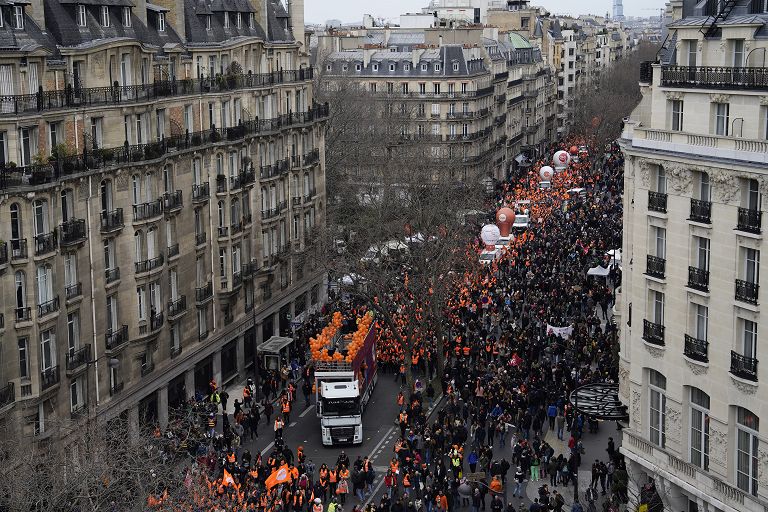A "firm France", the one wanted by the unions, "obviously hurts our fellow citizens", and "the first penalized, when we have strikes, are the most modest French", criticized Prime Minister Élisabeth Borne on Monday evening, defending on France 5 a reform that will guarantee the sustainability of "one of the pillars of our social model".
But the prime minister's words fall on deaf ears and just as the Senate, this afternoon, discusses the most controversial article of the pension reform, that of raising the 62 demonstrations organized throughout France for what union leaders have called "historic mobilization" come alive.
The Parisian procession has started and is driving along Boulevard Raspail, in the Latin Quarter, heading to Montparnasse and then to Place de l'Italie. In the lead, all the union leaders, behind a large banner against the reform: "on March 7 we block everything until the withdrawal". There is some tension in the dense demonstration in Nantes, in the west of the country, where the police launched some tear gas. The fear of the police authorities is that the peaceful march will become the scene of violence well known to the French since the days of fuel costs by ultras and yellow vests.
"We must not resign ourselves, it is possible to set the government back to 64," said CFDT boss Laurent Berger, who hopes to beat the record of January 31 (2.5 million participants according to organizers, 1.27 million according to authorities).
It is the sixth day of mobilization against the reform desired by President Emmanuel Macron. The Solidaires union calls for a "social tsunami" that will push the president to back down. According to opinion polls, the majority of the French are opposed to raising the retirement age, although many argue that Macron will eventually succeed. Buried at the end of 2019 after all-out strikes and the advent of Covid, the pension reform was among Macron's great unfulfilled promises in the previous five years (2017-2022). In the electoral campaign that reconfirmed him at the Elysée Palace in April, he pledged to launch it quickly, probably by the end of the summer. But between the opposition in the squares and in Parliament the road is all uphill.
Ap Photo
France, protests against pension reform
No fewer than 400-800 "ultras" of "yellow vests" are expected in the capital, as well as 300-500 far-left activists. In the regions, the mobilization will be particularly strong in Toulouse or Lyon, where, according to the secret services, the figure of 30,000 people could be reached. In several cities, large demonstrations were already held in the morning and night with barricades on highways and fires. The promise to stop France has been kept: transport is practically blocked, fuel supplies are blocked at storage facilities and petrol pumps while adherence to the strike is very high in almost all sectors, from school onwards.
Moreover, the unions are not backing down an inch and are preparing to call a new day of strikes and protests for next Saturday, March 11, according to union sources quoted by Le Figaro. The official announcement, specifies the newspaper in its online version, should come this evening, after a new meeting of the unions scheduled at the end of the march in Paris.

